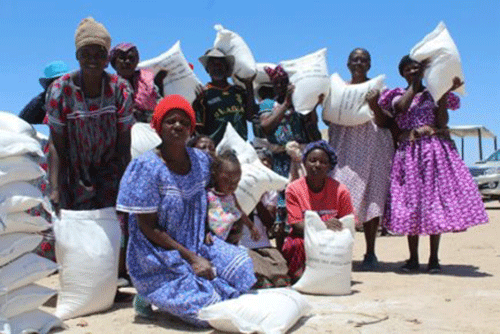Some northern regional councillors and residents are complaining that drought relief food is not enough for everyone.
When food is available, the prompt delivery and distribution to where it is needed is also hindered.
“Some beneficiaries in my constituency have gone for four months without receiving food,” said Immanuel Shikongo, the councillor of Outapi constituency in the Omusati region.
This is despite the government’s comprehensive nationwide relief food assistance programme in all the 14 regions from 1 October 2023 to 30 June 2024.
The drought relief programme is mainly catered to vulnerable Namibians, as well as those affected by natural calamities.
Ogongo councillor Daniel Iilende also said they don’t receive enough drought relief food for all the needy, which is a challenge.
“Drought might double itself this year; most farmers will not get anything from their crops field. We are pleading with the government to at least increase the number of people to get drought relief food,” he said.
Maria Petrus from Omagalanga in Omusati region told New Era they have not received any drought relief or food aid, although they are registered, adding they are starving, as a majority of them are without jobs.
“We are all affected; we have siblings that are employed but they don’t contribute anything at home. The government must stop rejecting us because of our housemates that are working,” she complained.
Petrus further said there is a need for better coordination by all those involved in the drought aid programme. “If thousands of Namibians are affected by drought, they must all receive relief food.”
Sonia Isak from Okatana constituency in Oshana region, who does not receive food aid, said she lost hope after seeing her wilted crops, and is now calling the government to assist her too with drought relief food.
Many northern farmers have lost hope in their crops growing due to the extreme heat accompanied by a prolonged dry spell and little rain.
According to Oshana governor Elia Irimari, the persistent drought situation has not only affected farmers and rural communities but has also had a significant impact on those in urban areas.
“Many families are facing challenges in accessing sufficient food and basic necessities, leading to increased vulnerability and hardship,” he said.
Irimari indicated that he is aware of a total of 6 560 people who have been registered in Oshakati alone and this number will triple if the vulnerable in Ondangwa and Ongwediva are added.
Omusati Regional Council spokesperson Simeon Kandjala said 42 476 have registered for drought relief programme in Omusati.
“In the month of October, November and December last year, 16 250 maize meal bags were allocated per house, while in the month of January February and March this year, 33 574 bags of maize meal are allocated per household,” he said.
Kandjala stated that sometimes the delay comes from the suppliers; that’s why some of the beneficiaries did not yet get their food.
According to the Office of the Prime Minister (OPM), they have through the Directorate Disaster Risk Management (DDRM) conducted 2023/24 livelihood Vulnerability Assessments and Analyses (VAA) last year.
“The VAA was conducted between May and July of 2023 and covered both urban and rural areas in all 14 regions. The outcomes of the VAA resulted in the declaration of the nationwide drought relief programme with effect from 1 October 2023- to 31 June 2024,” reads a statement from the OPM.
The OPM further said the regions were requested to verify and identify most vulnerable households to benefit from the drought relief assistance.
“Food relief distribution is coordinated by the Office of the Prime Minister in collaboration with regional councils across the country in all 14 regions,” OPM explained.
“Food items are procured according to the figures provided by the regional councils, therefore, if there are households that are not receiving the drought relief food, it is likely that they do not qualify or meet the criteria.”
“For beneficiaries that have not received food for allegedly four months, it is impossible,” said the OPM. It indicated that they could understand if they have not received food for one month, due to the delays from the contracted millers.
– vkaapanda@nepc.com.na



